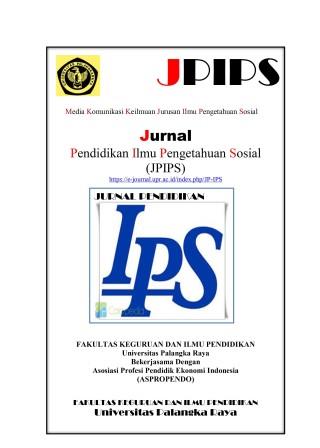Efektivitas Pembelajaran Daring Di Sekolah MTSN 1 Murung
DOI:
https://doi.org/10.37304/jpips.v14i1.4727Keywords:
Effectiveness, Online Learning, LearnersAbstract
The purpose of this study is to find out the effectiveness of online learning in MTsN 1 Murung. The questions you want to answer through this study are: 1) To find out the effectiveness of online learning in MTsN 1 Moody. 2) To find out the advantages and disadvantages in the implementation of online learning in MTsN 1 Murung. 3) To know what needs to be improved so that the implementation of online learning runs better and in accordance with the wishes. This research uses qualitative research methods with qualitative descriptive analysis techniques or interview data collection and documentation. The subjects of the study were the head of the madrassa, teachers and learners of MTsN 1 Murung. The data analysis technique in this study uses qualitative descriptive data analysis of interactive models from Milles and Michael Huberman consisting of three concurrent activity paths, namely; data reduction, presentation of data, and withdrawal of conclusions. Based on the results of research and interviews showed that online learning in MTsN 1 Murung is not effective considering that in its short implementation so that gutu can not know whether learners have understood the material or not, the advantages of online learning in MTsN 1 Murung Raya that learning can be accessed anywhere and anytime, learners can learn independently, the provision of tasks is more structured through applications. While the lack of online learning in MTsN 1 Murung is monitoring or monitoring the situation of students sulik done, signals / connections that are less stable in some areas. The field that needs to be improved so that online learning can run well is to increase the creativity of teachers in making learning media that are easy to understand, monitoring / supervision to learners is more tightened, and cooperation between parents and teachers must be well established
Downloads
References
Ai Faridawaty. 2021. Efektivitas Penggunaan M-Learning Dalam Pembelajaran Interaksi Sosial. Jurnal Pendidikan Ilmu Pengetahuan Sosial (JPIPS) Vol 13 No 2 hal. 109-113 https://e-journal.upr.ac.id/index.php/JP-IPS/article/view/3718.
Alexandro, Rinto. 2021. Teacher's Strategy in Managing Classes in Online Economics Learning to Increase Motivation and Achievement in Economics Learning for Class XI Social Sciences. JTP-Jurnal Teknologi Pendidikan. Vol 23 No 3 hal. 235-247 http://journal.unj.ac.id/unj/index.php/jtp/article/view/23262.
Bilfaqih, Y., & Qomarudin, M. N. (2015). Esensi Pengembangan Pembelajaran
Depdiknas. (2003). Undang-undang RI No.20 tahun 2003.tentang sistem pendidikan nasional.
Kuntarto, E. (2017). Keefektifan Model Pembelajaran Daring Dalam Perkuliahan Bahasa Indonesia Di Perguruan Tinggi. Indonesian Language Education and Literature, 03, 102.
Masruri, (2014). Analisis Efektivitas Program Nasional Pemberdayaan Masyarakat Mandiri Perkotaan (PNP-MP) (Studi Kasus Pada Kecamatan Bunyu Kabupaten Bulungan tahun 2010). Governance an Public Policy, vol. 1 (1): 1-23
Moleong, Lexy. (2014). Metode Penelitian Kualitatif Edisi Revisi. Jakarta: Remaja Rosda Karya.
Mustofa, Chodzirin, & Sayekti, L. (2019). Formulasi Model Perkuliahan Daring Sebagai Upaya Menekan Disparitas Kualitas Perguruan Tinggi. Journal of Information Technology, 01, 154.
Muhammad Nur Ismail, Rinto Alexandro. 2021. Pemanfaatan Media Pembelajaran Online Di Saat Pandemi Covid-19. Jurnal Ilmiah Kanderang Tingang. Vol 12 No 1 hal 37-46. https://www.chem-upr.education/ojs/index.php/JIKT/article/view/112.
Purwanto, A.,Pramono, R., Asbari, M., Santoso, P. B., Wijayanti, L. M., Choi , C., & Putri, R. S. (2020). Studi Eksploratif Dampak Pandemi COVID-19
Rohmawati, Afifatu. (2015). Efektivitas Pembelajaran. Jurnal Pendidikan UsiaDini, 17.
Rozi, F., & Hanum, C. B. (2019). Pembelajaran IPA SD Berbasis HOTS Menjawab Tuntutan Pembelajaran di Abad 21 Seminar Nasional Pendidikan Dasar Universitas Negeri Medan, 1, 1–10.
Sugiyono. (2017). Metode Penelitian Kuantitatif, Kualitatif, dan R&D. Bandung : Alfabeta, CV.
Sutopo. (2006). Metodologi Penelitian Kualitatif. Surakarta: UNS.
Syahrina Noormala Dewi. 2020. Dampak Covid 19 Terhadap Pembelajaran Daring Di Perguruan Tinggi. Jurnal Pendidikan Ilmu Pengetahuan Sosial (JPIPS) Vol 12 No 2 hal. 87-93 https://e-journal.upr.ac.id/index.php/JP-IPS/article/view/2734.
Sundari Sundari, Dehen Erang, Sri Rohaetin, Revnussa Octobery, Wenny Awalina. (2021). Inovasi Pembelajaran Bebasis Aplikasi Teknologi Dalam Meningkatkan Efektifitas Learning From Home Di Program Studi Pendidikan Ekonomi FKIP UPR. Jurnal Pendidikan Ilmu Pengetahuan Sosial (JPIPS) Vol 13 no 1 hal. 68-73. https://e-journal.upr.ac.id/index.php/JP-IPS/article/view/2815














